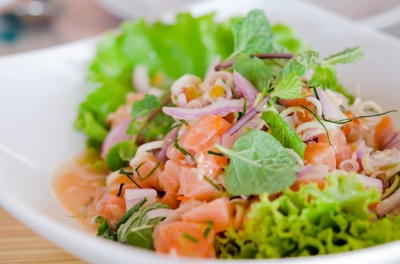
Eating Disorders include rules like only eating salads.
Image courtesy of rakratchada torsap at FreeDigitalPhotos.net
Parents of teenagers call me for a number of varying concerns, one of which is that their daughter has an eating disorder. Once in counseling for any reason, girls frequently reveal they believe they are fat. Of the girls who believe they are fat, a significant number are actively trying to lose weight. If their efforts are dangerous enough, they qualify for an eating disorder. Lately I have been seeing a lot of girls with eating disorders, so it seems like a good time to address this.
The first thing that might have struck you as odd is that I wrote, “If their efforts are dangerous enough, they qualify for an eating disorder.” You might be wondering what I mean by “dangerous.” Girls (and less often boys) that are trying to lose weight are usually doing so in unhealthy ways. For example, there are numerous risks associated with frequent self-induced vomiting. It rots teeth, has the potential to burn a hole in the esophagus, and can cause electrolyte imbalances; sometimes these electrolyte imbalances have caused death.
Other dangerous things adolescents do to lose weight is crash diet, work out too hard (causing sickness and injury), take laxatives, fast, cut out certain food groups, and use drugs. All of these things can be dangerous. Nutrition is an essential part of our health. Girls who are struggling with an eating disorder are nutrition obsessed, but often eat very unhealthily.
One example comes from a girl I know who has an eating disorder. She has numerous misconceptions about food based on the current cultural fads. She believes carbohydrates are like putting poison into her body. If she eats salads for lunch and dinner then she assumes she has eaten a very healthy diet for that day. In fact, all she has done is eat a low calorie diet while missing out on essentials like carbohydrates and proteins.
Therapists are by no means nutritionists, but we are often required to address nutritional issues. For this reason, in most cases, eating disorders are treated in conjunction with a registered dietician. The dietician helps the teen plan appropriate eating. The therapist then helps the teenage girl with the emotions surrounding staying on a food plan; this can be extremely challenging.
Eating disorders are primarily emotional. Girls with anorexia are in tight control over their diet. They control their food in what appears to be an unemotional manner. However, anorexic teens live with constant feelings of self-disgust, shame, and fear. This differs slightly from teenagers with bulimia, who also feel the self-disgust, shame and fear plus a numbing during a binge.
If you are concerned your daughter has an eating disorder, here are a few questions you can ask. First, ask your daughter if she feels comfortable with her body. You can directly ask if she’s ever trying to diet. Find out from her how much she is concerned with her daily diet. Nearly all girls are conscious of these things, but many still eat normally and exercise moderately. You want to determine if it seems a bit extreme. If your daughter is very defensive when you ask these questions, that can also be a sign of trouble.
Helping teens grow and families improve connection,
Lauren Goodman, MS, MFT


